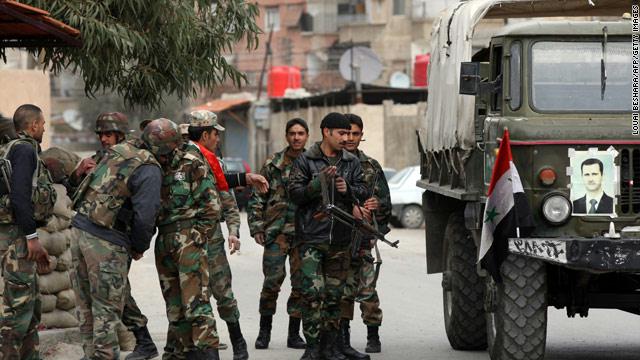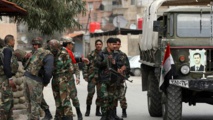In the past few days, army troops have launched a major counteroffensive in a bid to reach the besieged group but also potentially to retake the town, which lies near the Turkish border as well as the regime stronghold of Latakia province.
"The loss of Jisr al-Shughur had an effect in terms of psychology and morale on the Syrian street, so it's a particularly important battle for the regime," said Bassam Abu Abdullah, director of the Damascus Centre for Strategic Studies.
In addition, the presence of the officers and soldiers stranded inside the hospital is a bitter reminder of a similar situation last summer where regime forces were left behind and killed by jihadists.
"This battles is both symbolic in terms of the army proving it doesn't leave soldiers behind on the field and helpless, and strategic because Jisr al-Shughur opens the door to the Latakia region," said Waddah Abed Rabbo, chief editor of the pro-government Al-Watan newspaper.
The regime's commitment to returning to Jisr al-Shughur and freeing those trapped inside the hospital comes from President Bashar al-Assad himself.
Last Wednesday, he pledged "the army will arrive soon to these heroes trapped in the Jisr al-Shughur hospital."
Assad's government is eager to avoid a repeat of August 2014 when jihadists executed more than 200 soldiers after they seized Tabqa air base in Raqa province.
Photos and video of the executions spread throughout social media and horrified supporters of the regime, with many questioning why the forces had been left behind in Tabqa.
A group of pro-regime Alawite youth were even arrested for their criticism of the defence minister afterwards.
- A regime message -
"The regime wants to send a message that it won't leave its soldiers behind like in Raqa," said Rami Abdel Rahman, director of the Syrian Observatory for Human Rights, a Britain-based monitor.
There are differing accounts of who is trapped in the hospital complex on the southwestern edge of Jisr al-Shughur that rebels entered on Sunday, prompting fierce clashes with those inside.
The Observatory said some 150 regime forces and another 100 civilians and government bureaucrats are inside.
But a Syrian security source said 120 special forces were in the complex, including a colonel, adding that the troops had barricaded themselves in after refusing orders to evacuate.
The source said an officer inside the complex insisted "there are no civilians, only soldiers."
"We have water, food and plenty of arms and ammunition. We're just waiting for the army to return," the source quoted the officer as saying.
The fighting that broke out inside the complex on Sunday night left at least 72 rebels and regime forces dead, according to the Observatory.
The setback in Jisr al-Shughur capped a string of regime losses, including Idlib's provincial capital and a nearby military base.
It has also suffered losses in southern Daraa province, where it lost a key border post with Jordan and the ancient town of Bosra al-Sham.
Some analysts have attributed the rebel successes to a rapprochement between previously bickering opposition backers including Saudi Arabia and Turkey.
On Monday, Syria's opposition National Coalition chief Khaled Khoja referred to "rapprochement between countries in the region."
"This has had a positive effect by changing the balance of forces in Syria these last two months," he said.
- Losses not irreversible -
Still, Abu Abdullah -- whose think-tank is close to the government -- cautioned that the regime setbacks and even the encirclement of forces in Jisr al-Shughur were not irreversible.
"It's not the first time that encircled troops have been able to resist," he said.
"In Aleppo prison, they held out for more than a year and a half before the siege was broken."
A second security source told AFP that the counteroffensive to reach those trapped in Jisr al-Shughur is being led by Colonel Suheil Hassan, reputedly an Assad favourite and nicknamed "the Tiger."
A recent video circulating online purportedly shows Hassan on the phone to his superiors complaining that a lack of ammunition had forced him to retreat from Jisr al-Shughur.
"He wants to take his revenge," the source said.
--------------------------------------------------------------------------------------------------------------
"The loss of Jisr al-Shughur had an effect in terms of psychology and morale on the Syrian street, so it's a particularly important battle for the regime," said Bassam Abu Abdullah, director of the Damascus Centre for Strategic Studies.
In addition, the presence of the officers and soldiers stranded inside the hospital is a bitter reminder of a similar situation last summer where regime forces were left behind and killed by jihadists.
"This battles is both symbolic in terms of the army proving it doesn't leave soldiers behind on the field and helpless, and strategic because Jisr al-Shughur opens the door to the Latakia region," said Waddah Abed Rabbo, chief editor of the pro-government Al-Watan newspaper.
The regime's commitment to returning to Jisr al-Shughur and freeing those trapped inside the hospital comes from President Bashar al-Assad himself.
Last Wednesday, he pledged "the army will arrive soon to these heroes trapped in the Jisr al-Shughur hospital."
Assad's government is eager to avoid a repeat of August 2014 when jihadists executed more than 200 soldiers after they seized Tabqa air base in Raqa province.
Photos and video of the executions spread throughout social media and horrified supporters of the regime, with many questioning why the forces had been left behind in Tabqa.
A group of pro-regime Alawite youth were even arrested for their criticism of the defence minister afterwards.
- A regime message -
"The regime wants to send a message that it won't leave its soldiers behind like in Raqa," said Rami Abdel Rahman, director of the Syrian Observatory for Human Rights, a Britain-based monitor.
There are differing accounts of who is trapped in the hospital complex on the southwestern edge of Jisr al-Shughur that rebels entered on Sunday, prompting fierce clashes with those inside.
The Observatory said some 150 regime forces and another 100 civilians and government bureaucrats are inside.
But a Syrian security source said 120 special forces were in the complex, including a colonel, adding that the troops had barricaded themselves in after refusing orders to evacuate.
The source said an officer inside the complex insisted "there are no civilians, only soldiers."
"We have water, food and plenty of arms and ammunition. We're just waiting for the army to return," the source quoted the officer as saying.
The fighting that broke out inside the complex on Sunday night left at least 72 rebels and regime forces dead, according to the Observatory.
The setback in Jisr al-Shughur capped a string of regime losses, including Idlib's provincial capital and a nearby military base.
It has also suffered losses in southern Daraa province, where it lost a key border post with Jordan and the ancient town of Bosra al-Sham.
Some analysts have attributed the rebel successes to a rapprochement between previously bickering opposition backers including Saudi Arabia and Turkey.
On Monday, Syria's opposition National Coalition chief Khaled Khoja referred to "rapprochement between countries in the region."
"This has had a positive effect by changing the balance of forces in Syria these last two months," he said.
- Losses not irreversible -
Still, Abu Abdullah -- whose think-tank is close to the government -- cautioned that the regime setbacks and even the encirclement of forces in Jisr al-Shughur were not irreversible.
"It's not the first time that encircled troops have been able to resist," he said.
"In Aleppo prison, they held out for more than a year and a half before the siege was broken."
A second security source told AFP that the counteroffensive to reach those trapped in Jisr al-Shughur is being led by Colonel Suheil Hassan, reputedly an Assad favourite and nicknamed "the Tiger."
A recent video circulating online purportedly shows Hassan on the phone to his superiors complaining that a lack of ammunition had forced him to retreat from Jisr al-Shughur.
"He wants to take his revenge," the source said.
--------------------------------------------------------------------------------------------------------------









 Home
Home Politics
Politics











